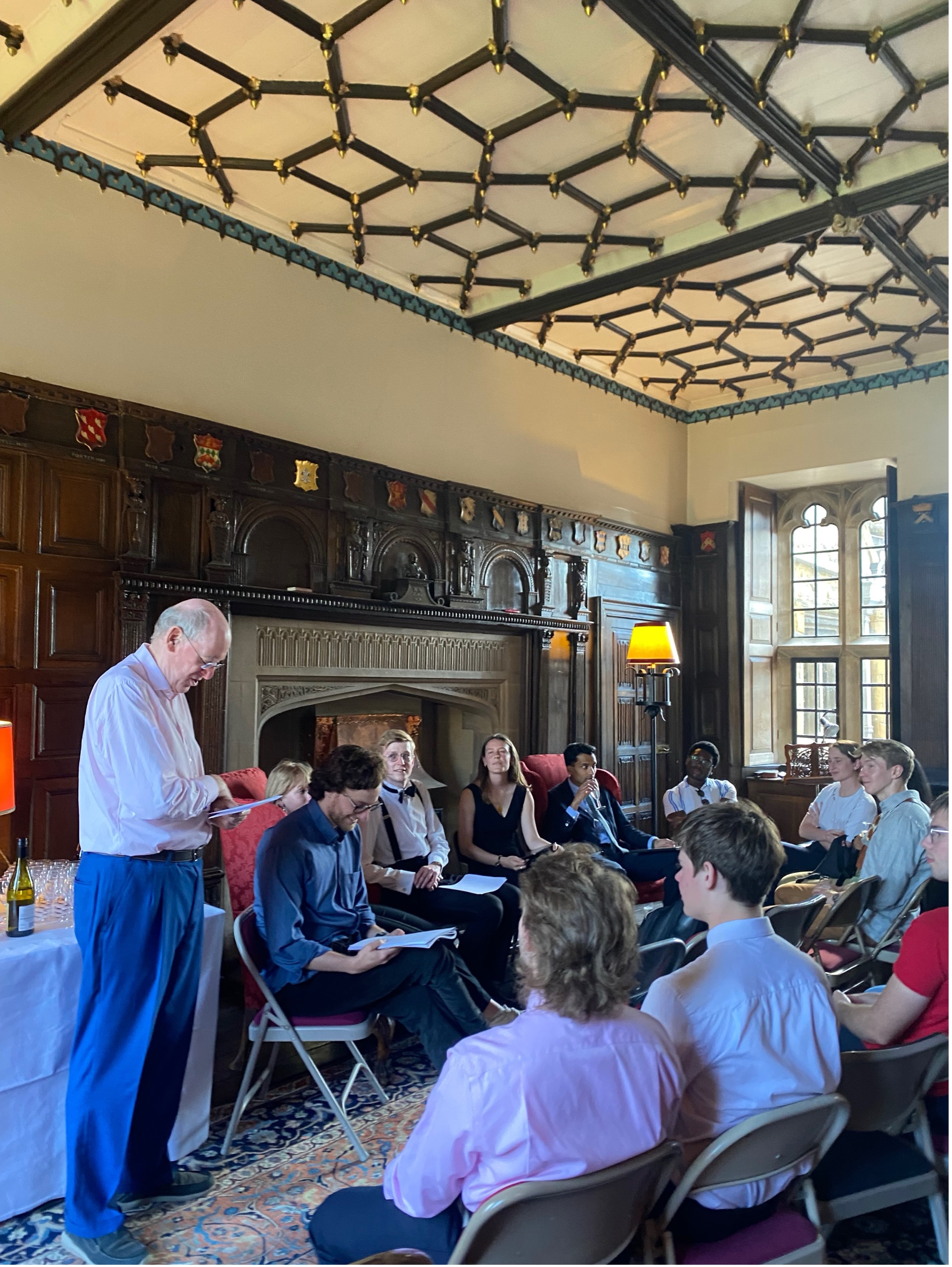MCR presents the inaugural 'New College Salon'

On Saturday, 25 May, the “New College Salon” was hosted by the Warden in his lodgings, with plenty of white, red, and prosecco to go around! The event was organised by the New College MCR to showcase some of the spectacular, interesting, and thought-provoking research by its members. Warden Miles Young opened the event and introduced a mixture of education, humanities, and STEM speakers. Despite Summer Eights, there was a turnout of over 30 MCR members. The topics discussed stretched across research in the humanities, education, chemistry, neuroscience, and vaccine policy. Many conversations were had before and after the salon on the issues raised by our speakers, who each gave fantastic presentations on their research areas.
The first of our speakers was Kate McKee, whose Doctoral research in the Faculty of Modern Languages investigates the concept and implications of smells and smelling in medieval Italian literature. Kate had us all take a moment to smell and experience the smells of the Warden’s lodgings, suggesting that we could all appreciate smell more in our daily lives. Many MCR members were quick to ask questions of Kate, especially about how she intertwined her own personal experiences of smell with her academic research, and how smell has taken such a central position in her understanding. Kate brought a fantastic humanities buzz, bustle and funkiness to the salon, kicking us off into rethinking our senses.
The second speaker was Adrian Fernandes, who discussed diversifying English literature texts in schools. He spoke powerfully of the problems of “the canon” in English literature and how teachers could incorporate writers that are from the “global majority”. Adrian brings important experience having taught English at three schools and heading up one of them, which he said made him realise the resistance to building on or changing “the canon”. Terminology is critical in his work, and many at the salon remarked on how well-thought-out Adrian’s words were. A common sentiment was that this is certainly someone we would all want to be our English teacher! Many of the questions brought together salon members’ own experiences of English texts from their home countries, such as Germany and Iran.
Zoë Nicholas was the third speaker who began our transition into the STEM research of our 2024 MCR cohort. Zoë spoke about antimicrobial resistance in N. Gonorrhoea and how her project – in its early stages – plans to reverse it. Her work is at the cutting edge and remains understudied as, she says, many researchers and pharmaceutical companies are unwilling or hesitant to investigate the issue of antibiotic & antimicrobial resistance. Many were curious about Zoë’s research, which, she warned would be rather bleak. A key takeaway was that Gonorrhoea is a prevalent and often understated issue in the world, and we must understand how to combat it further. It is clear that Zoë is, like the other salon speakers, on a mission to improve and better understand our world, which many in the room reflected on as being very inspiring and important.
The fourth speaker was Arne Gehlhaar, who spoke about controlled human infection models and how these are being used at Oxford to aid vaccine development. Arne addressed the “big three” diseases of malaria, tuberculosis, and HIV and how each is being combatted with vaccine development. He had us all listen to an audio recording which documented each death, per minute, by diseases. Arne informed us of the latest work at the Oxford Vaccine Group, and many members were especially interested in the generous funding for participation. Arne’s talk was thought-provoking, and questions were asked about how Oxford is participating as a “hub” in these controlled infection models.
The final speaker of the salon was Fitzroy “Pablo” Wickham, who gave a terrific unscripted presentation on – in short – the brain. He asked all MCR and JCR members present whether they had a brain and, when some didn’t raise their hand, was rather concerning! Pablo specifically discussed his important work in the brain’s white matter tracts and how it is currently understudied. His lab uses behavioural, clinical, and neuroimaging data to better understand white matter’s role in human decision-making. His presentation was a fantastic wrap-up of the salon, and led to many fruitful conversations about dementia, ageing, and the importance of the brain. One positive indication Pablo is seeing is that those who have gone to higher education have a lower chance of developing issues, so perhaps that’s a good sign for us in the MCR! After all the talks, further drinks were had where all participants could have some more conversations and think deeper about the issues discussed.
Report by Pat Flood, MCR Social Secretary
